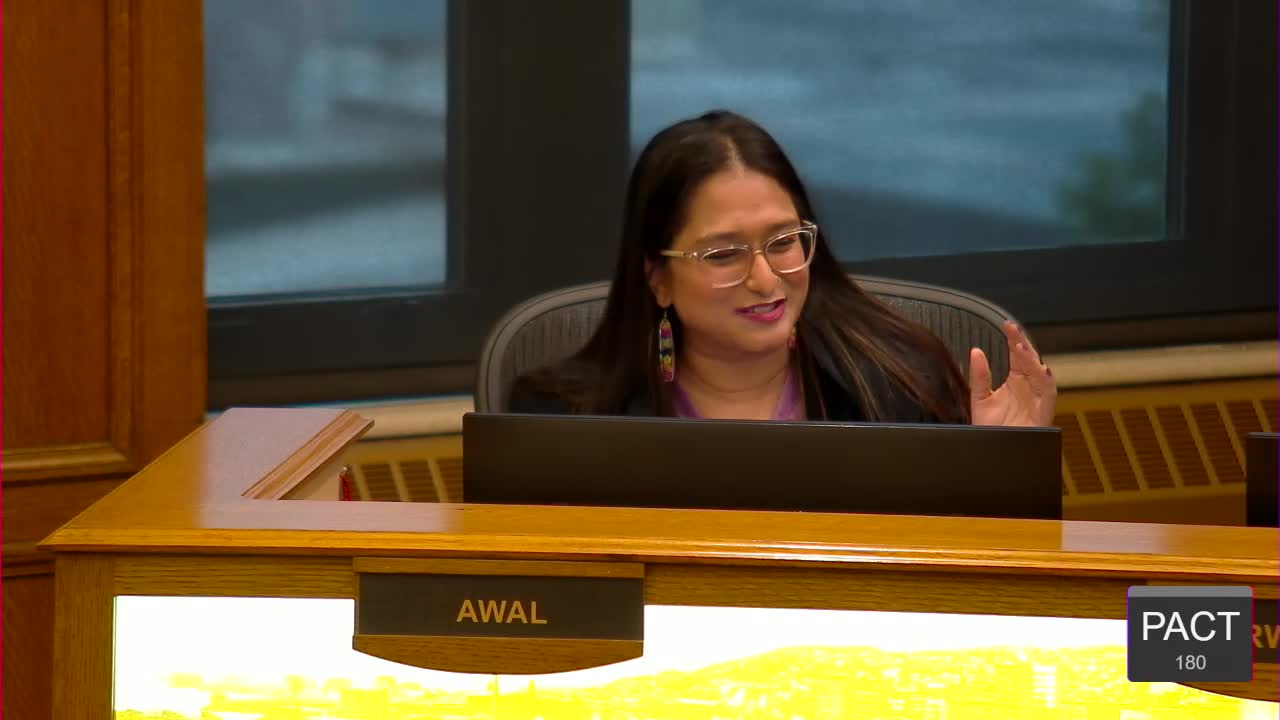Councilors Debate Resolution Supporting LGBTQ Rights amid Commission Reorganization Efforts
September 08, 2025 | Duluth, St. Louis County, Minnesota
This article was created by AI summarizing key points discussed. AI makes mistakes, so for full details and context, please refer to the video of the full meeting. Please report any errors so we can fix them. Report an error »

During the recent City Council meeting in Duluth, significant discussions centered around the restructuring of boards and commissions, particularly focusing on the Human Rights Commission and its potential transition to a committee model. This conversation reflects ongoing efforts to enhance community engagement and address the needs of diverse populations within the city.
Councilor Awe initiated the dialogue by expressing gratitude to various community members and city officials who contributed to the development of a new resolution aimed at supporting the LGBTQ+ community. This resolution is seen as a continuation of the council's commitment to inclusivity and representation. Awe emphasized the importance of community collaboration in shaping the language and intent of the resolution, highlighting contributions from local activists and organizations.
However, Councilor Kennedy raised concerns about the timing and structure of the resolution, suggesting that it might be prudent to pause and consider the broader context of consolidating boards and commissions. Kennedy argued that the council should focus on improving the efficiency and effectiveness of these bodies before introducing new resolutions. This sentiment was echoed by other council members, who noted that many commissions have struggled with participation and meeting quorum, indicating a need for a more flexible and supportive structure.
Councilor Forsman acknowledged the council's historical support for LGBTQ+ rights but also pointed out the challenges faced by existing commissions. He advocated for a resolution that would not only support the LGBTQ+ community but also address the underlying issues affecting commission functionality. Forsman suggested that the council should prioritize actionable steps over symbolic resolutions, especially in light of budget constraints.
In response, Councilor Owl provided insight into ongoing efforts to reform the commission structure. She explained that many commissions have not been meeting regularly due to strict requirements that hinder participation. Owl proposed exploring a committee model that would allow for greater flexibility and inclusivity, enabling more community members to engage in the decision-making process.
The meeting concluded with a commitment to further discussions on the proposed changes to the commission structure. Councilor Owl plans to gather feedback from various commissioners and community members before presenting a comprehensive model to the council in October. This approach aims to ensure that any changes reflect the needs and voices of the community, fostering a more inclusive environment for all residents.
Overall, the discussions at the Duluth City Council meeting underscore a critical moment for the city as it navigates the complexities of representation, community engagement, and the effectiveness of its governance structures. The outcome of these deliberations could significantly impact how diverse voices are heard and represented in local government moving forward.
Councilor Awe initiated the dialogue by expressing gratitude to various community members and city officials who contributed to the development of a new resolution aimed at supporting the LGBTQ+ community. This resolution is seen as a continuation of the council's commitment to inclusivity and representation. Awe emphasized the importance of community collaboration in shaping the language and intent of the resolution, highlighting contributions from local activists and organizations.
However, Councilor Kennedy raised concerns about the timing and structure of the resolution, suggesting that it might be prudent to pause and consider the broader context of consolidating boards and commissions. Kennedy argued that the council should focus on improving the efficiency and effectiveness of these bodies before introducing new resolutions. This sentiment was echoed by other council members, who noted that many commissions have struggled with participation and meeting quorum, indicating a need for a more flexible and supportive structure.
Councilor Forsman acknowledged the council's historical support for LGBTQ+ rights but also pointed out the challenges faced by existing commissions. He advocated for a resolution that would not only support the LGBTQ+ community but also address the underlying issues affecting commission functionality. Forsman suggested that the council should prioritize actionable steps over symbolic resolutions, especially in light of budget constraints.
In response, Councilor Owl provided insight into ongoing efforts to reform the commission structure. She explained that many commissions have not been meeting regularly due to strict requirements that hinder participation. Owl proposed exploring a committee model that would allow for greater flexibility and inclusivity, enabling more community members to engage in the decision-making process.
The meeting concluded with a commitment to further discussions on the proposed changes to the commission structure. Councilor Owl plans to gather feedback from various commissioners and community members before presenting a comprehensive model to the council in October. This approach aims to ensure that any changes reflect the needs and voices of the community, fostering a more inclusive environment for all residents.
Overall, the discussions at the Duluth City Council meeting underscore a critical moment for the city as it navigates the complexities of representation, community engagement, and the effectiveness of its governance structures. The outcome of these deliberations could significantly impact how diverse voices are heard and represented in local government moving forward.
View full meeting
This article is based on a recent meeting—watch the full video and explore the complete transcript for deeper insights into the discussion.
View full meeting
